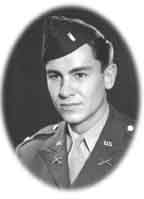RECOVERY TEAM NO.56
HQ. AMER. DIV. ARTY
APO 716
22 September 1945
SUBJECT: REPORT OF RECOVERY TEAM 56
TO: HQ XI CORPS. APO 471
ATTENTION: RECOVERED PERSONNEL DET.
1. Report on Ofuna POW Camp
a. Location- One (1) Km. Northwest of Ofuna RR Station in
the Kanagawa Prefecture. Coordinates 656-1380 on Central Honshu
Map, scale-1/50.000. Ofuna POW camp is a branch of Tokyo Internment
camp (Omori). It is known as the Ofuna Detachment of the Tokyo
Internment Camp. It is a Naval POW Camp and as far as known the
only one in Japan.
b. Description of the camp: The camp is located in the site of
a former School House and was opened the 7th April 1942. The
buildings that are there were built with the intention of housing
prisoners of war. The buildings are built on the same order as
an American Army Hospital Camp in so far as the buildings are
all connected to each other. The buildings are of unpainted wood
roofed with tar paper. There are 90 private rooms in the buildings
that are approximately 6 feet wide and 9 feet long. One of the
small rooms is devoted to a dispensary. There are two latrines
in the camp and a shower room. There is also one large room for
the Japanese guards. There is one kitchen and adjoining storage
spaces. There is also a room for the Japanese Naval Commander,
a non com’s room and a small orderly room. There were facilities
for electric lights in each room but no facilities for heating.
Medical supplies were inadequate, besides a few Japanese first
aid kits abd assorted items, the only medical supplies were those
dropped [by B-29's]. The camp is 75 yards long and 68 yards wide
and surrounded by a board fence 8 feet high. The supplies were
dropped by American planes before the POW’s left. There
were 14 drums dropped.
The camp is believed to have been used as an interrogation center
and records were found to show that various transfers of POW’s
were made to Tokyo Internment Omori. The Japanese personnel guarding
the camp consisted of 1 Japanese Naval Lt. Jida Kakazo, who was
the commander of the the camp, 1 NCO and 11 Japanese seaman.
[illegible] assumed to say Recovered records:
a. Japanese list of deaths in the camp and place of burial.
b. Roster of ashes of deceased Prisoners of War.
c. Certificates of transfer of American and Allied Prisoners
of War.
d. Japanese records of the Prisoners of war in Ofuna camp after
Aug. 1944
e. Japanese records of receipts for food delivered to Ofuna camp.
f. Assortment of Papers with names on them.
Deaths in the camp-
In checking records it was found that 6 men died in Oduna
Camp. They were
1. Lt. (Jg) 1. Richard L. Hunt
Died, 25 Feb 1945
Born, 25 Dec 1921
It was found that when he was brought to the camp he was bandaged
from head to foot. This condition was due to burns when the B-29
he was in crashed. He started to receive treatment in the camp
17 Jan 1945. [Died shortly after an injection
by the camp doctor. Assumed to have been murdered by poison]
2. Lt.(jg) William Zeimer [correct spelling of name]
Died 2 Aug 1945 [Possibly murdered]
Cause- Malnutrition
Born - 1921
Got sick- 1 April 1945
Was attached to aircraft carrier Enterprise
3. Lt. (Jg) Norman Wesley Imel
Died- 16 March 1945
Cause- Pneumonia [Died shortly after an
injection by the camp doctor. Assumed to have been murdered by
poison]
Born 1920
Came to Ofuna March 1945
was attached to USS Monterey
4. Ensign Kenneth Ashton Flinn
Died- 23 July 1945
Born- 1923
No record as to when came into camp
Got sick 8 June 1945
Was Naval pilot on the Aircraft Carrier Essex.
5. Lt (jg) Antone Mensis [Mynzys- Chief
Eng of Norwegian ship taken captive]
No other information
6. Lt. (Jg) Ernest Peso [Pershau, Ernest
F]
Died 9 June 1945
No record as to when came into camp
11th Bomb Group (VH) 431 Bomb Squadron
3. Burial Plots:
Lt. Emel W. Norman, Ensign Kenneth Ashton Flinn, Lt. William
Zeimer were buried 220 meters East of Ofuna camp. Graves are
marked with Japanese crosses.
Lt. (Jg) Richard L. Hunt buried 166 Meters North and in the rear
if Ryuhoji Temple. The ryuhoji Temple is located 100 yards East
of Ofuna POW Camp
Lt. (Jg) Antone Mensis [Mynzys]
and Lt. (Jg) Ernest F. Peso [Pershau]
have Japanese crosses with Lt. Hunt but they were cremated and
their ashes sent to Omori camp.
4. Summary
The above information was obtained by a thorough investigation
and search of the Ofuna POW Camp and from records found and by
talking with Jida Kaskazo a Lt. In the Japanese Navy who as commander
if the camp for approximately the last year. We were told by
him that all the Japanese records concerning the camp were burned
by Japanese Soldiers who came down from Jap. Hq. The 25 September
1945.
The roster of ashes of deceased POW was found in the camp but
is not a roster of the deaths in the camp. It was brought to
the camp by a POW from another camp. The men whose names have
an X to the left of them were listed in the Roster of Non-recovered
personnel prepared by GHQ AFPAC.
/s/ Robert H. Dolder
2d Lt. Robert H. Dolder
Team Leader
Team 56 |
